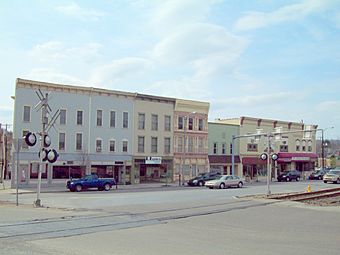St. Marys Historic District (St. Marys, Pennsylvania) facts for kids
Quick facts for kids |
|
|
St. Marys Historic District
|
|

St. Marys Historic District, April 2010
|
|
| Location | Roughly bounded by Walburga, St. Michael, Fourth, John, and Mill Sts., St. Marys, Pennsylvania |
|---|---|
| Area | 170 acres (69 ha) |
| Built | 1842 |
| Architect | Hyde-Murphy Co.; et al. |
| Architectural style | Italianate, Gothic Revival, Romanesque |
| NRHP reference No. | 98001368 |
| Added to NRHP | November 25, 1998 |
The St. Marys Historic District is a special area in St. Marys, Pennsylvania. It's like a time capsule showing how the town grew. This district is in Elk County, Pennsylvania.
It includes many old buildings, sites, and objects. These all help tell the story of the area. The district covers the main shopping area and nearby homes. It also includes St. Joseph's Convent.
Contents
What is a Historic District?
A historic district is a group of buildings, sites, or objects. They are important because of their history or architecture. The St. Marys Historic District was added to the National Register of Historic Places in 1998. This means it's officially recognized as a place worth protecting.
Exploring the District
The St. Marys Historic District has 399 buildings that add to its history. It also has two special sites and one structure. You can find five unique objects there too. The oldest building is made of stone and was built around 1845.
The earliest part of the district is built around a central area called the "Diamond." This was likely a very important spot when the town first started.
Important Buildings and Architects
Many historic churches are located within the district. One special building is the John E. Weidenboerner House. It is so important that it is listed separately on the National Register.
Two buildings in the district were designed by a famous architect named William P. Ginther. He designed the Sacred Heart Church, which was built between 1906 and 1907. He also designed an addition to St. Joseph's Convent in 1907.
Gallery




